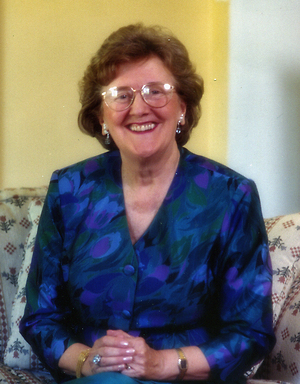- Entry type: Person
- Entry ID: AWE4939
Roderick, Gwendoline Blanche
(1928 – )
- Born 18 June, 1928, Toowoomba Queensland Australia
- Occupation Public relations professional, Volunteer, Women's rights activist, Women's rights organiser
Summary
Gwen Roderick was the first Western Australian woman to be elected president of the National Council of Women of Australia-63 years after it was founded. She brought to the presidency a passion for efficient management that served the association well during a difficult period in terms of its relationship with government.
Details
Gwen Roderick was born Gwendolyn Blanche Pearce in Toowoomba, Queensland, and educated at Fairholme Presbyterian Ladies College in that city. She trained as a secretary and held several administrative positions, including that of personal assistant for public relations to the Queensland manager of the ANZ Bank. She then travelled overseas, working in London and then Canada, where she was employed as an assistant producer for Canadian Television. Gwen married a Canadian geologist, Stanley Roderick, and had two children born in Canada. The family then spent 6 years in Brazil and 5 years in Queensland, finally settling in Perth, Western Australia, where she was a producer for community radio.
Roderick joined the National Council of Women of Western Australia as a delegate from the State Women’s Council of the Liberal Party. In 1984, she became the state convenor of economics, in 1987 the honorary secretary, and, from 1991 to 1994, president of NCW WA. Relations with the state government were excellent during this period. When Roderick was elected president of the National Council of Women of Australia for the 1994-1997 triennium, she was the first Western Australian woman to hold this position, an indication that, after 6 decades, communication barriers with the state most distant from Canberra had finally become less significant within the NCWA. Furthermore, Western Australia’s minister for women’s interests assisted in facilitating communication with the eastern states by supplying an office and office equipment for the NCWA Board, allowing administrative processes to be modernised, with teleconferencing employed to overcome the remaining elements of the tyranny of distance.
Roderick was always an advocate of bureaucratic and business efficiency. In 1995, she took the NCWA Board through a SWOT analysis (Strengths, Weaknesses, Opportunities, Threats) of the organisation. The major challenge was the rise of a new coalition of women’s organisations, CAPOW! (Coalition of Participating Organisations of Women) initiated by the Women’s Electoral Lobby, which, under the Keating federal Labor government, was displacing NCWA as the peak body linking government and women’s groups. Government funding of NCWA was also under threat. Roderick and the Board responded by developing promotional material, publicising the fact that NCWA represented some 500 organisations, looking to maintain a corporate image with a national logo, badges and stationery, cultivating bureaucrats and media representatives, producing high-quality submissions, and organising high-profile national seminars with prominent speakers on matters of public interest, such as women and technology. The election of the Howard Liberal-National Party government in 1997 undermined CAPOW!’s ministerial access and raised that of NCWA once more but failed to guarantee recurrent funding for non-government women’s organisations.
Roderick’s Board faced a further challenge in the ongoing and growing antagonism between the Hobart-based National Council of Women of Tasmania and the National Council of Women of Launceston. An attempt was made by Launceston delegates to the Perth conference of 1997 to redirect and resolve this conflict by focusing on the principle of regional organisation but without success. The continuing conflict became the major challenge confronting Roderick’s successor as president of NCWA.
As national president, Roderick represented NCWA at many national and international meetings. She has been a member of the Optus, Telstra and Austel telecommunication advisory councils, where she spoke as a consumers’ representative. In 1995, she was a delegate representing NCWA and Australia at the 39th session of the UN Commission on the Status of Women in New York. This was the final preparatory meeting for the Beijing 4th World Conference on Women: Action for Equality, Development of Peace, which she also attended in September 1995. Roderick then led the Australian delegation to International Council of Women conferences in Auckland and Ottawa in 1997, acknowledging the importance of putting Australia’s views to ICW although she emphasises that her major concerns were national ones and that ‘Australian women were my priority’.
In August 1997, Gwen Roderick was one of 10 representatives from women’s organisations invited to meet with Prime Minister John Howard. The NCWA’s major areas of concern were economic security for older women, women on public service boards and committees, domestic and community violence, availability of clean water for all Australians and family-friendly workplaces.
Roderick was also a member of the WA Censorship Advisory Committee, an executive member of the WA branch of the Order of Australia Committee, and a life member of the Australian Institute of Mining and Metallurgy Women’s Auxiliary.
In 1998, Gwen Roderick received the NCWA Centenary Award, and, in 1999, she was made a Member of the Order of Australia, for ‘service to women, particularly through the National Council of Women of Australia’.
‘The challenges ahead are unlimited in the support of women and their families in the community.’
Published resources
-
Site Exhibition
- Stirrers with Style! Presidents of the National Council of Women of Australia and its predecessors, National Council of Women of Australia, 2013, http://www.womenaustralia.info/exhib/ncwa
-
Resource
- Trove: Roderick, Gwendoline Blanche (19280618-), http://nla.gov.au/nla.party-1665958